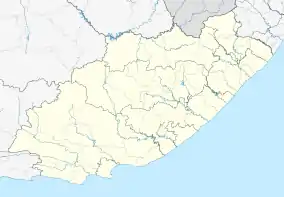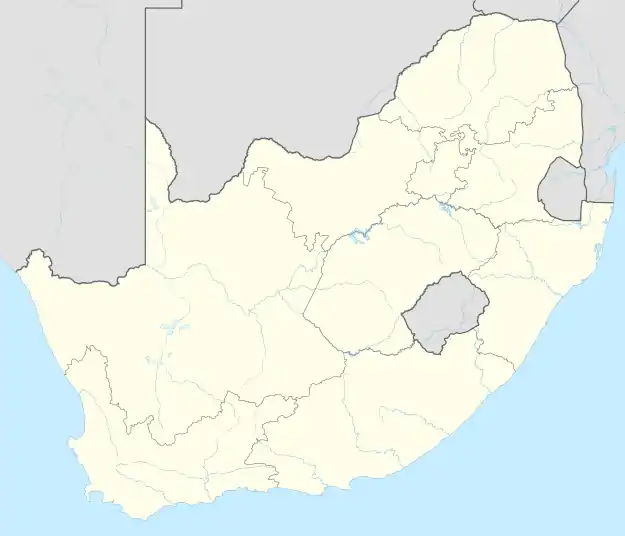KwaBhaca
KwaBhaca, formerly Mount Frere,[2] is a town located in the Eastern Cape province, previously known as the Transkei region, of South Africa. Its name in Xhosa is kwaBhaca, or "place of the Bhaca people", who settled here early on.
KwaBhaca | |
|---|---|
.jpg.webp) Main street of KwaBhaca | |
 KwaBhaca  KwaBhaca | |
| Coordinates: 30°55′S 28°59′E | |
| Country | South Africa |
| Province | Eastern Cape |
| District | Alfred Nzo |
| Municipality | Umzimvubu |
| Established | 1876 |
| • Councillor | (ANC) |
| Area | |
| • Total | 3.53 km2 (1.36 sq mi) |
| Population (2011)[1] | |
| • Total | 5,252 |
| • Density | 1,500/km2 (3,900/sq mi) |
| Racial makeup (2011) | |
| • Black African | 96.1% |
| • Coloured | 1.2% |
| • Indian/Asian | 0.8% |
| • White | 0.8% |
| • Other | 1.1% |
| First languages (2011) | |
| • Xhosa | 86.6% |
| • English | 6.0% |
| • Zulu | 1.6% |
| • Other | 5.7% |
| Time zone | UTC+2 (SAST) |
| Postal code (street) | 5090 |
| PO box | 5090 |
| Area code | 039 255 |
KwaBhaca is situated between Kokstad and Mthatha along the N2 road about 100 km north east of Mthatha. It is administered by the Alfred Nzo District Municipality and the villages are ruled by the Tribal chief with intermediary borders.
History
KwaBhaca was initially named Mount Frere and was founded in the 17th century named after Sir Henry Bartle Edward Frere. In February 2016, Mount Frere was renamed KwaBhaca.[2]
Economy
There is one major street in KwaBhaca and it is the Main street on the N2 road. It has many restaurants, shops and public services including the Police Station, Post Office, Municipal offices and the newly built Madzikane Ka Zulu Memorial Hospital. Most of the businesses and shops are situated along the Main street, there are only a few outside this area.
There are a lot of farmers in and around KwaBhaca and most of the people rely on subsistence farming for their basic needs. Peaches, pears, oranges and maize meal are the most popular fruits and vegetables in KwaBhaca and recently there has been involvement from the Municipal to change these Subsistence farmers into Commercial farmers.
Demographics
KwaBhaca has a population of over 5,000 although this might appear as crowded, the town in fact, has the smallest population, as most people are from the surrounding rural villages. The closest village is Lubhacweni which is located north of the town.
Rural villages surrounding the own still lack basic services like proper roads, electricity and water. Villages include Dangwana, Kumahamane, Mbondleni, Mtwana, Mtshazi, Mvuzi, Toleni, Mhlanganisweni, Qoqa, Lugangeni and others.
Local tribes living in KwaBhaca are the amaBhaca, amaHlubi, amaZizi, AmaMpondo and AmaMpondomise people, divisions of the Xhosa speaking people.
KwaBhaca is underdeveloped in terms of infrastructure and sanitation. There are few proper public roads and most of the roads are gravel roads. Most people who do not have water tanks still make use river water, most of the villages are also still without electricity.
There is rarely any skills development in the area and as a result most of the youth have moved to the cities and more developed towns like Mthatha, Gauteng, Cape Town and Kokstad. Most of the people in KwaBhaca are the elderly as this is mostly accelerated by the staggering unemployment rate and lack of essential services, like proper infrastructure and skills development.
Religion
The majority of KwaBhaca's inhabitants are of Christian and Traditional African religion. There are minute populations of Islamic and Buddhists religions, mostly the foreign shopkeepers in rural villages.
The most prominent churches are the Methodist and Anglican churches and the Assemblies of God. Most of the people who live in KwaBhaca are black people, there is a very small percentage (less than 1%) of white, Indian and foreign populations in KwaBhaca,
Culture
There are Primary and Secondary Schools known as Jolobe Junior Secondary School, Mount Frere High School and Ingwe Further Education and a Training College. The Madzikane Ka Zulu Memorial Hospital (previously known as Mary Theresa Hospital) is situated along the N2 main road, a few kilometer east out of town. It is one of the largest hospitals in the province and a landmark in the area.
List of villages surrounding KwaBhaca
KwaBhaca has many villages that are under the control of traditional leaders and chiefs. Below are the villages, some established as early as 1820:
|
|
|
|
References
- "Main Place Mount Frere". Census 2011.
- "Government Gazette No. 39669" (PDF). South African Government. 2016-02-09. p. 9. Retrieved 8 August 2019.
.svg.png.webp)